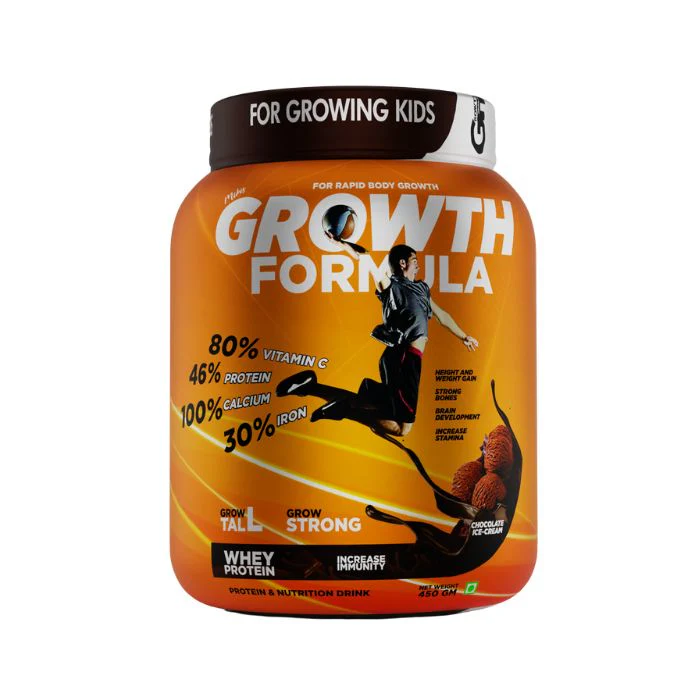healthcare

June 30,2025 • 5 min read
What Parents Should Know About Protein Powder for 4-Year-Olds?

As parents, we always want the best for our children—especially when it comes to their health, growth, and nutrition. One question that many moms and dads ask today is:
“Is protein powder safe for my 4-year-old?”
While protein is important for a child’s development, it’s equally important to understand how much they need, when supplements are needed, and how to choose the right product. In this guide, we will walk you through everything parents need to know about protein powder for 4-year-olds in simple and clear language.

Why Is Protein Important for a 4-Year-Old?
At age four, children are full of energy. They are growing fast, learning new skills, and developing both physically and mentally. Protein plays a big part in this process.
What does protein do for young children?
- Helps build muscles and bones
- Repairs body tissues
- Supports healthy skin, hair, and nails
- Helps in the growth of cells
- Supports the immune system
Even though protein is only one part of a balanced diet, it plays a major role in helping children grow strong and stay active.
How Much Protein Does a 4-Year-Old Need Daily?
Many parents worry that their child is not eating enough. But the truth is, most healthy children get enough protein from their regular meals—if they eat a variety of foods.
Recommended Daily Protein for a 4-Year-Old:
On average, a 4-year-old needs about 13–19 grams of protein per day.
This can be easily met with:
- A glass of milk
- A bowl of lentils or beans
- Some yogurt
- A small egg
- A piece of chicken or tofu
So, before you turn to supplements, it's important to look at your child’s current food intake.
When Should You Consider Protein Powder for a 4-Year-Old?
Protein powder is not always necessary, but in some special cases, it can be helpful.
Protein powder may help if your child:
- Is a very picky eater
- Has a small appetite and skips meals
- Is underweight or has trouble gaining weight
- Is recovering from an illness
- Has a medical condition that affects eating or digestion
- Is allergic to common protein foods like eggs or milk
If your child falls into any of these categories, talk to your pediatrician or a child nutritionist before adding a protein powder to their diet.
Is Protein Powder Safe for Toddlers?
This is one of the most common questions. The answer is:
Yes, but only if it is specially made for children.
Many protein powders on the market are made for adults, athletes, or gym-goers. These are not safe for children, especially toddlers. They may contain:
- Too much protein
- Added sugar
- Artificial flavors and preservatives
- Caffeine or energy-boosting ingredients
- Vitamins and minerals in amounts that are too high for kids
Always look for:
- Child-specific formulas
- Natural ingredients
- Balanced nutrition (not just protein)
- Age-appropriate dosage
A great example is Growth Formula, a trusted brand known for creating child-safe protein powders with essential nutrients for healthy growth.
What to Look for in a Good Protein Powder for 4-Year-Olds
Here’s a simple checklist for parents who are looking to buy a safe and healthy protein powder for their little one:
1. Natural Ingredients
Look for powders made with simple, whole food-based ingredients. Avoid anything with chemical names you can’t pronounce.
2. No Added Sugar or Artificial Sweeteners
Some brands try to make their powders tasty by adding sugar, which can cause health problems later. Choose unsweetened or naturally sweetened options.
3. Added Vitamins and Minerals
A good product should also contain calcium, iron, zinc, and vitamin D—important nutrients for your child’s growth.
4. Easy to Digest
Check if the powder is gentle on the stomach. Some include probiotics or enzymes to support digestion.
5. Tastes Good
If your child doesn’t like the taste, they won’t drink it! Choose flavors like chocolate, banana, or vanilla that kids enjoy.
How to Add Protein Powder to Your 4-Year-Old’s Diet
If your doctor says it's okay to use protein powder, you can easily add it to everyday meals in fun and healthy ways.
Easy ways to use protein powder:
- Mix it into milk or smoothies
- Stir it into porridge or oatmeal
- Add it to pancake or waffle batter
- Mix into homemade yogurt
- Blend into fruit milkshakes
Start with small amounts and watch how your child reacts. Make sure they like the taste and don’t have any stomach issues.

Important Safety Tips for Parents
To use protein powder safely and correctly, keep these tips in mind:
Always talk to your doctor first
Even if it’s made for children, it’s best to check with your child’s pediatrician before starting a new supplement.
Stick to the recommended dose
Too much protein is not healthy for children. Always follow the serving size on the label or as recommended by your doctor.
Don’t use it as a meal replacement
Protein powder should be a supplement, not a substitute. Your child still needs a variety of real foods like fruits, vegetables, grains, and dairy.
Watch for side effects
If your child shows signs of stomach discomfort, allergies, or changes in mood or energy after starting a new supplement, stop using it and consult your doctor.
Final Thoughts
For most healthy 4-year-olds, a balanced diet is enough to meet their protein needs. But in cases where extra support is needed—due to picky eating, poor appetite, or medical reasons—a safe, child-specific protein powder like Growth Formula can be a helpful addition.
Always choose products made especially for kids, free from harmful additives, and approved by your healthcare provider. When used with care, nutrition protein powders can support your child’s growth, energy, and development.
growth formula Details
User Profile
- Full name
- growth formula
- Email address
- growthformulaseo@gmail.com
- Join Date
- 2025-06-30
- State
- Haryana
- City
- Gurgaon
- Pincode
- 122001
- Address
- Mikis Specialities Pvt. Ltd. 4656/281, Second Floor, Daultabad Industrial Area, Gurugram, Haryana - 122001
- Follow us on Facebook
- Follow us on Twitter
- Website Name
- https://growthformula.in/
- Bio
- Growth Formula offers safe, nutrition-rich protein powders to support natural height growth and development in kids and teens.